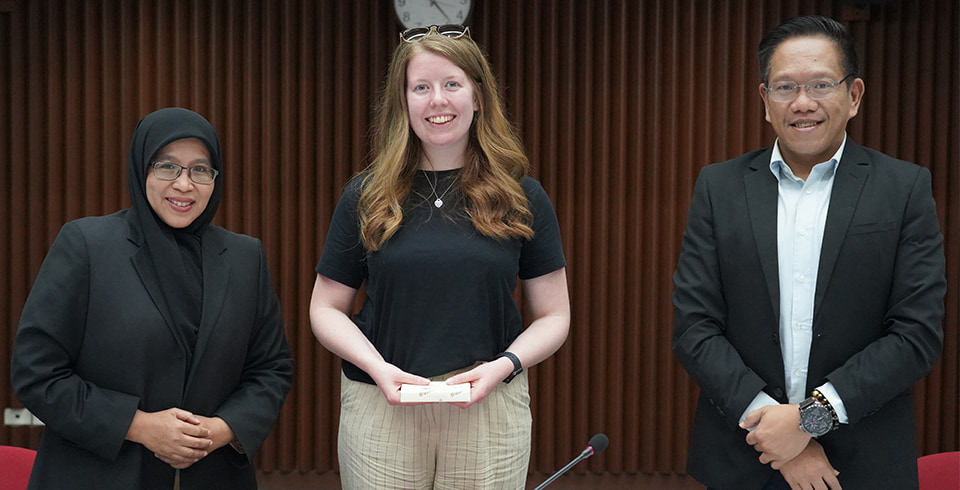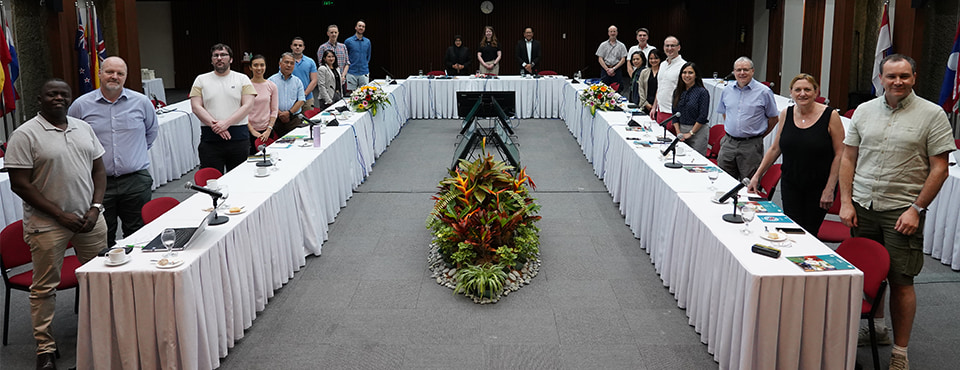 SEARCA officials welcome UK team led by Amy Flynn (center), Programme Coordinator - Energy Catalyst Brokerage - Innovate UK
SEARCA officials welcome UK team led by Amy Flynn (center), Programme Coordinator - Energy Catalyst Brokerage - Innovate UK
LOS BAÑOS, Laguna. The national innovation agency of the United Kingdom (Innovate UK), along with 10 other companies, and the Southeast Asian Regional Center for Graduate Study and Research in Agriculture (SEARCA) broached areas for collaboration on agricultural innovation and renewable energy.
The exploration for areas of partnerships was done when representatives from Innovate UK, along with 10 companies from the UK, visited on 17 March 2023 and exchanged their respective thrusts and activities.
Dr. Nur Azura Adam, SEARCA deputy director for programs, presented the National Agriculture and Fishery Modernization and Industrialization Plan (NAFMIP) 2021–30, a directional strategy of the Philippine Department of Agriculture (DA). SEARCA was commissioned by the Asian Development Bank to develop the NAFMIP in partnership with the Department of Agriculture and FAO.
NAFMIP, as a strategic plan, will guide sector-wide growth. It is linked to other plans such as the commodity industry roadmaps, Provincial Commodity Investment Plans (PCIPs), and the National Climate Change Action Plan of the Philippines (NCCAP).
“The agri-fishery sector, among others, is vital in addressing the impacts posed by environmental changes, including climate change, and in mainstreaming climate action at all levels," said Dr. Nur. With the NCCAP, the seven strategic priorities are updated to align with the latest climate science and national development priorities. These priority areas are food security, water sufficiency, ecological and environmental stability, human security, climate-smart industries and services, sustainable energy, and knowledge and capacity development as the strategic direction for 2011 to 2028,” said Dr. Nur.
She added that the national agencies on agriculture and energy came out with a joint memorandum on formulating and implementing a renewable energy program for the agri-fishery sector.
In line with this, SEARCA initiated a project on carbon farming and is working together with Straw Innovations Ltd on the Rice Straw Biogas Hub project. The Web-Based Integrated Spatial Engine and Smart Ecosystem (WISE) Carbon Farming project aims to develop standards for allowing agro-industry to offer carbon credits. “Specifically, the WISE carbon farming hopes to implement on-farm-level carbon mitigation technologies and approaches; develop profitable carbon agribusiness models; and reduce carbon footprints on Southeast Asian farms,” shared Dr. Romeo Labios, SEARCA technical consultant. In relation to this, SEARCA, in partnership with the Bangko Sentral ng Pilipinas (BSP), will hold a Roundtable Discussion Series on Sustainable Food and Agriculture Systems in Southeast Asia next month.

On the other hand, Mr. Craig Jamieson, founder of Straw Innovations Ltd., showcased the Rice Straw Biogas Hub. The hub collaborates with UK-registered startup Straw Innovations Ltd., as lead proponent, SEARCA, the UK SME Koolmill, and UK academic partner. Started in September 2022, the project is expected to generate biogas as clean energy from waste rice straw and provide innovative technology services for rice farmers. The project is preparing for its first commercial-scale in Laguna, Philippines. Funded by Innovate UK, the hub intends to enable rice farmer cooperatives to see a working model that can be applied across the Philippines for income resilience.
Innovate UK showcased various energy startups. Dr. Emmanuel Matsika, director of Environmental & Quality Solutions Ltd., showed the company’s financial model for rural areas to produce clean and affordable renewable electricity. He recognized that large quantities of biomass wastes are affecting the globe. “These present a great opportunity to turn the abundance of rice husk waste to generate clean and cheaper electricity in rural areas,” said Dr. Matsika.
Dr. John Allport, professor at the Department of Engineering and Technology from the University of Huddersfield, presented how their energy integration laboratory turns wastes from local companies and the university into energy and eventually as fertilizers. He added that their department’s full-scale systems could be developed and are open to being tested further at energy test sites worldwide.
The link of wood pellet production to deforestation and alternatives to the high cost of forest raw materials were discussed by Mr. Mark Paulson, director of Mostex Global Solutions Ltd. Recognizing these challenges, Mostex was set up in 2019 to find sustainable sources of nonwoody biomass for clean and cheap fuel in power generation.
Mr. Sergio Cardamas, managing director of DpSun Limited, shared that the company works on rural electrification, eMobility, and building-integrated photovoltaics (BIPV). Mr. Cardamas shared that they have recently partnered with Indonesia to support a remote community in producing coconut commodities and with the Indo-Pacific to reduce emissions, costs, and energy insecurities for ice cream retailers.
Meanwhile, Aeon Energy’s mission to create innovative net-zero renewable energy solutions for climate-vulnerable communities was elucidated by Chief Executive Officer Mr. Martim Cunha. He discussed that the rise of wave power to generate clean and sustainable energy for all mankind is vital to save money and the environment.
Lastly, Mr. James Diddams, director of Archelous Energy, presented the need to embrace hydrokinetic power generated by water motion in rivers and tidal currents. He highlighted that their 200KW prototype project on Flooding Instream Tidal and Solar (FITS) hydrokinetic generation unit was proven over a series of successful test rounds on the Hlaing River, Myanmar, in 2021. “With our system in place, a community will benefit from safe, reliable, clean electricity, replacing greenhouse gas emissions and providing them multiple opportunities for improved livelihoods,” said Mr. Diddams.
After the presentations, the Innovate UK group toured the SEARCA Hub for Agricultural and Rural Innovation for the Next Generation (SHARING), an interactive museum of agricultural innovation.
Innovate UK and the 10 companies were received by the SEARCA executive committee led by Assoc. Prof. Joselito Florendo, deputy director for administration and Dr. Nur, deputy director for programs. With them were Ms. Corinta Guerta, technical advisor to the director; Dr. Maria Cristeta Cuaresma, senior program head of Education and Collective Learning Department (ECLD); Dr. Gerlie Tatlonghari, program head of Research and Thought Leadership Department (RTLD); Ms. Ma. Christina Corales, program specialist and officer-in-charge, Emerging Innovation for Growth Department (EIGD); Sharon Malaiba, head, Partnerships Unit (PU); and other SEARCA staff.